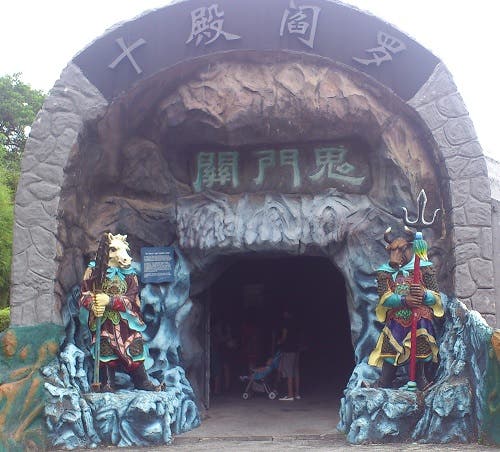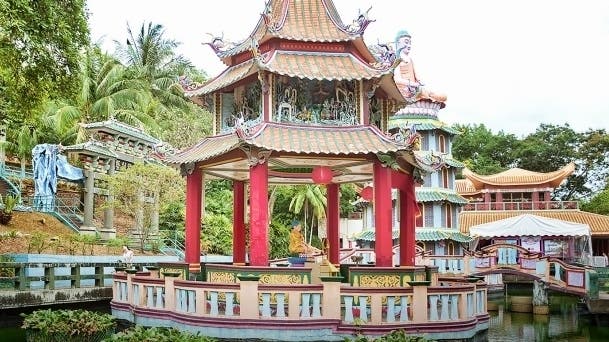Someone should make a game about: the Chinese underworld
The 10 courts of hell.
As a Chinese kid growing up in Singapore, visiting Haw Par Villa - a cultural theme park and national treasure - is a rite of passage, both anticipated and feared, because of its infamously graphic dioramas depicting Diyu, or the Chinese underworld. Built in 1937 by the founder of Tiger Balm, Aw Boon Haw, the park celebrates Chinese mythology in all its gory glory. Its crown attraction - The Ten Courts of Hell - lay out a dramatic timeline of judgment, penance, and redemption through its aging statuary.
Diyu is bloody. It's weird. It's got clear performance metrics, and a coveted outcome: positive reincarnation. If you mess up, you'll probably end up as a cockroach. In short, it lends itself perfectly to a video game.
Like most cultural representations of hell, Diyu is not a fun place. Depending on just how good or bad you've been in your lifetime, you undergo various "treatments" (spoiler: mostly torture) and perform different tasks before reincarnation even happens. Level design would be fun, too - the whole thing is an enormous maze made up of different circles or courts that escalate by crime and punishment.
Diyu is ultimately a spectacular combination of mundane bureaucracy with soul-searing, skin-flaying body horror. In an extremely Chinese way, it has exactingly specific punishments for exactingly specific moral crimes: sibling disrespect, encouraging riots, and even rent evasion, which wouldn't sit well in a post-coronavirus world. People who waste food get sawn into half; people who cheat on tests get disemboweled. It's a folkloric vision of purgatory fuelled by syncretistic Buddhist and Taoist philosophies, which usually - hopefully - ends in a newly reincarnated life for the wayward soul.

A dead soul first meets Diyu's two guardians, Ox Head and Horse Face, who bring newcomers to Yanluo Wang, the god-king of hell, who rules over the fifth court. Yanluo Wang is literally a judge, who, depending on mythological variations, can be absolutely terrifying or relatively reasonable. He's the guy who evaluates you on your entire life and determines when you can leave - a great setup for character creation along the lines of the Souls games, but hopefully, unlike Bloodborne's realest option, you don't start off as a "waste of skin."
The ten courts of hell (some interpretations claim there are 18, but hey, who's counting when you're having a good time) is a sprawling metropolis under the ground, filled with tortured souls that feel pain just as they did in corporeal life. Each is presided over by a judge-king who answers to Yanluo Wang, and besides these main courts, there are thousands of smaller, lesser hells, too - the potential number of side quests and expansions are mind-boggling. There's even a preexisting currency that could be retconned into an RPG - joss paper (often called "hell money" in the west), a relatively modern invention traditionally burned as offerings to the dearly departed.
Most famously, Taiwan's Red Candle Games incorporated elements of Diyu into their critically acclaimed indie title Devotion, borrowing narrative elements from hell to craft their own distinctly Taiwanese story. But there's still room for so many more interpretations of this singularly over-the-top underworld, with a wealth of scholarly articles and popular legends to draw from. It would be riveting to see more literal, traditional versions of Diyu, perhaps even as an MMO, where suffering souls can band together like a 21st-century media union.
If you're reading this and feel inspired to make a Cronenbergian horror world powered by a multicultural symphony of different but equally rigid moral doctrines, please - on pain of punishment in the afterlife - consult a Chinese person on it.

